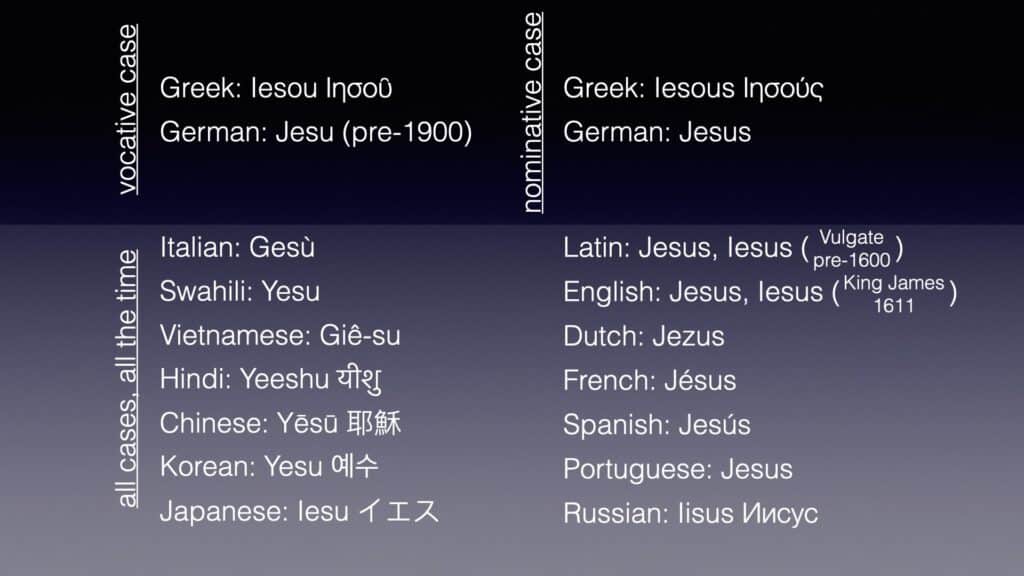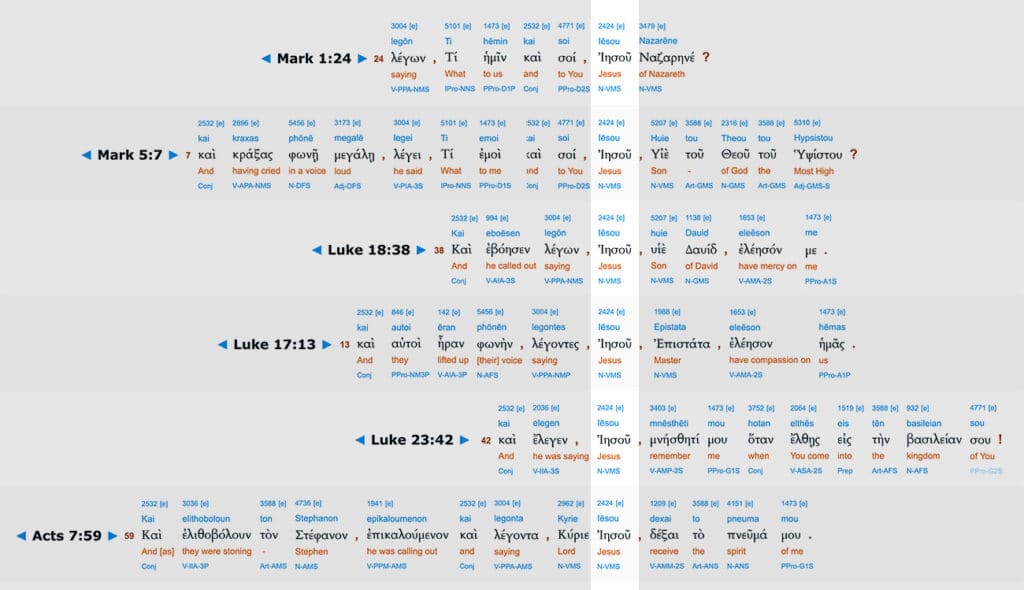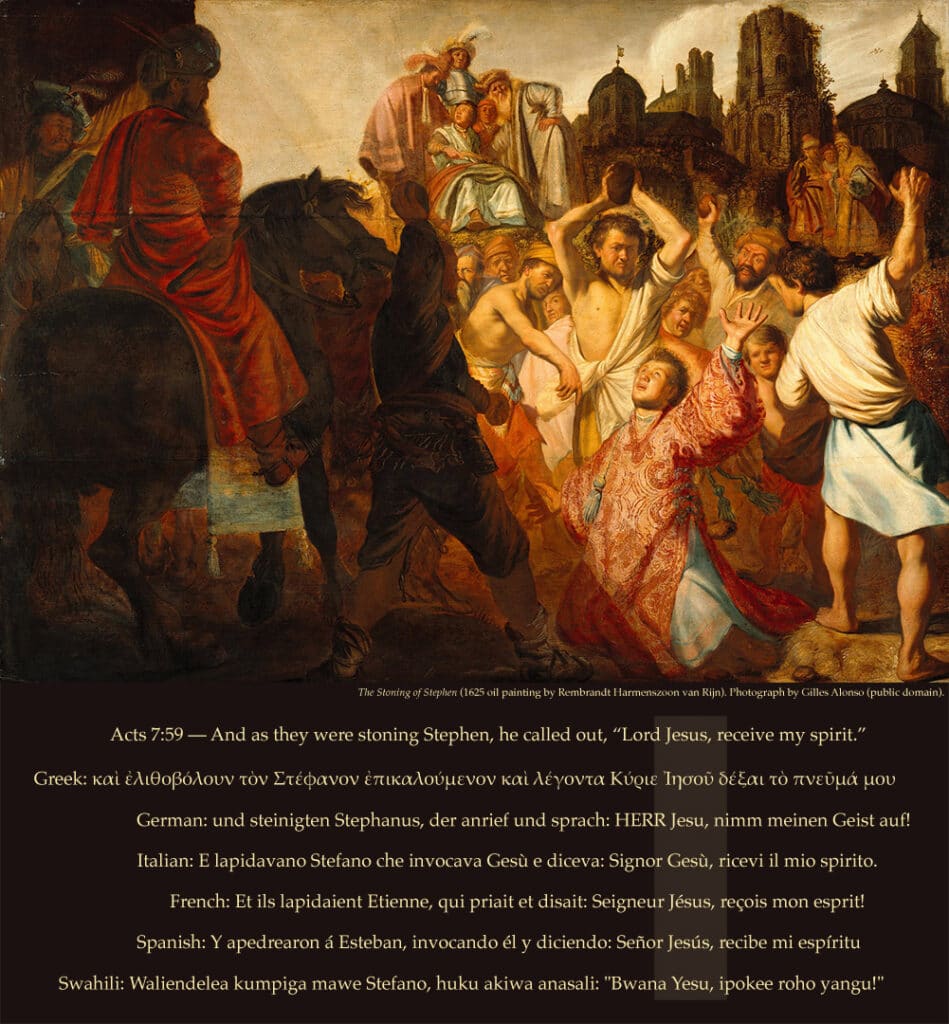
Table of Contents
More Info About The Name Of Jesus
One of my readers sent me extensive Biblical research that I want to share with the rest of my readership! He wants to remain anonymous, however. In any case, he presented what I consider valuable information, so I will copy quite a bit of what he wrote to me and add my commentary.
The name Jesus was called in Galilee, Judea, and Samaria is relatively easy to determine from Greek Scripture, and it is the oldest and best evidence we have.
See the image below. There are six occasions in the New Testament where Jesus was addressed personally. He was always addressed as Iesou. Not one single time was he addressed as Iesous.

Again, in each instance, a biblical character or characters are speaking directly to Jesus. They address him as Iesou in EVERY situation. This name Iesou is a transcription of the name spelled Ysw in Galilean Aramaic. Because there are no vowels in the Aramaic version, this name couldn’t be transliterated letter-for-letter; “Isw” wouldn’t be readable in Greek.
Therefore, vowels were provided so a reader could vocalize the name IeSou. The final letter W in Ysw evidently signaled a long U sound (as in the English word, soon) that in Greek was indicated with the diphthong “ou”. This diphthong is also found in the familiar Greek versions of the Hebraic words allelouia and Ioudas (Judah). In these two examples, the underlying long U sound is also indicated by the letter W (hllWyh and yhWdh, respectively).
The letter J in German is called “jot.” This is the same jot that we read about in English Bible translations in the quote from Jesus: “Jot and title.” The jot in German is absolutely the counterpart to the Greek iota and Hebrew yod. In Matthew, Jesus indeed refers to the Hebrew yod because it is the smallest character in the Hebrew alphabet. The names Jesus and Jesu in German are actually pronounced Yesus and Yesu, like the Greek Iesous and Iesou. In the 1611 King James, Jesus is likewise spelled Iesus, reflecting its Greek source.
How Did We Get The Letter “J”?
It wasn’t until the next big revision that you find Jesus (plus many names that formerly began with the letter I in the 1611 KJV were changed to start with the letter J: Iacob became Jacob, etc.). It is not clear why this change occurred. It could arguably be because of the influence of the Luther Bible, which used J (jot) for all these names. And so perhaps there was an effort to standardize the spelling of our Savior’s name between the Anglos and the Saxons. But that’s still speculative.
The English J’s function change occurred around the time of the Norman (French) Conquest. Coincidence? It seems plausible that the English letter J eventually became less Saxon (German) and more Norman (French). The French pronunciation of Jesus is similar to the English, whereas the German pronunciation remains almost identical to the Greek.
Different Spellings?
So what about the name Jesus? In Greek, Iesous is called a declined form of the name Iesou. If you read the Greek New Testament, you will also come across another spelling of Jesus — Iesoun. This is also another declined form of Iesou. What’s going on here? Why the different spellings of Jesus? Answer: This is Greek grammar at work. (German grammar is also similar).
Notice in the attached image that underneath the text of the name Jesus, there are the abbreviations N-VMS. This indicates the grammatical form of the Greek version of the name. N = noun. V = vocative. M = masculine. S = singular. Nouns, masculine, and singular are straightforward in meaning. What does vocative mean? This is the grammatical case when a person or thing is being addressed, or being inVOKed. Okay?
So in these six dialogs shown in the image, characters are addressing Jesus — “Jesus” is being used in the vocative case. And so Greek grammar instructs us to spell the name as it was actually pronounced by the speaker. In each example, the speaker addressed Jesus as “Iesou.” The thief on the cross, Stephen, towards the end of his martyrdom, a group of ten lepers, two demon-possessed men, and Bartimaeus, the blind beggar: they all address Jesus as “Iesou.” Powerful evidence!

The grammatical case is called nominative when Jesus is the subject of a sentence. And in interlinear text, you will see the label N-NMS in such instances, meaning noun-nominative-masculine-singular. The practice in Biblical Greek was to add the letter S to the end of Iesou’s name to indicate this grammatical function: Iesous. Another way to think about it is that Iesous is how Jesus was referred to in the third person. When he was addressed directly, he was called Iesou.
The grammatical case is called accusative when Jesus is the direct object in a sentence. And you will see the label N-AMS in such instances, meaning noun-accusative-masculine-singuar. The practice in biblical Greek was to decline Iesou’s name with a final letter N to indicate this grammatical function: Iesoun.
There are two other cases, dative and genitive. Dative means indirect object, N-DMS. Genitive means to show possession, N-GMS. In these cases, the name Iesou is not declined and thus remains Iesou.
Okay? That’s it.
This is kind of hard to wrap your head around if you’re unfamiliar with Greek or German. But I live in Germany and understand German and so it totally makes sense. In Germany, “Jesu” is still used today to refer to Jesus. You might recall the chorale by the German composer Johann Sebastian Bach: “Jesu, Joy of Man’s Desiring.” That’s an example. But my German mother-in-law still actively uses the name Jesu today (again, pronounced Yesu in German).
English has declensions of pronouns but not names. For example,
THEy THEm THEir: three different grammatical forms of the plural pronoun:
THEy = nominative (subject)
THEm = accusative (direct object)
THEir = genitive (possession)
Examples:
THEy called someone.
Someone called THEm.
Someone called THEm in regard to THEir problem.
Replace the above pronouns with a name, like Jesus, and there is no declension in English:
Jesus called someone.
Someone called Jesus.
Someone called Jesus in regard to the problem of Jesus.
However, in Biblical Greek, the spelling of Jesus would be modified strictly according to the grammatical case, as described above.
So, according to Greek Scripture, “Yeshu” is how Jesus was recognized on the street during his time on earth. I’ve read that this name was pronounced with the emphasis on the second syllable: ye-SHU, but it is impossible to know for sure without an audio recording from two thousand years ago.
My German friend also mentioned that Jesus’ name is identical to the name used for the English word Joshua, as found in Numbers 13:16, which I also mentioned in my previous article, “The Name Of Jesus.”
I don’t know, but perhaps the Greek word “Iesou” is also a commonly used “nickname” for the more formal Hebrew name of Jehoshua. Maybe someone more knowledgeable than me can help me find this out? Please write to me if you have more information!
Please check out our other Articles!